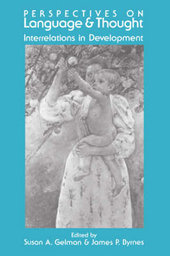
|
Perspectives on Language and Thought: Interrelations in Development
Hardback
Main Details
| Title |
Perspectives on Language and Thought: Interrelations in Development
|
| Authors and Contributors |
Edited by Susan A. Gelman
|
|
Edited by James P. Byrnes
|
| Physical Properties |
| Format:Hardback | | Pages:540 | | Dimensions(mm): Height 237,Width 156 |
|
| Category/Genre | Philosophy of language |
|---|
| ISBN/Barcode |
9780521374972
|
| Classifications | Dewey:401 |
|---|
| Audience | | Professional & Vocational | |
|---|
|
Publishing Details |
| Publisher |
Cambridge University Press
|
| Imprint |
Cambridge University Press
|
| Publication Date |
25 October 1991 |
| Publication Country |
United Kingdom
|
Description
From the time of birth through the early school years, young children rapidly acquire two complex cognitive systems: They organize their experiences into concepts and categories, and they acquire their first language. How do children accomplish these critical tasks? How do conceptual systems influence the structure of the language we speak? How do linguistic patterns influence how we view reality? These questions have captured the interest of such theorists as Piaget, Vygotsky, Chomsky, and Whorf but until recently very little has been known about the relation between language and thought during development. Perspectives on Language and Thought presents current observational and experimental research on the links between thought and language in young children. Chapters from leading figures in the field focus on the acquisition of hierarchical category systems, concepts of time, causality, and logic, and the nature of language learning in both peer and adult-child social interactions. Four major themes are presented. First, children honor constraints or biases that limit the possible meanings they consider when learning new words. Second, the conceptual systems underlying language use are intricately subtle and complex. Third, children's 'naive theories' about the world may be integral to their early word meanings. Fourth, studying the nature of social interaction can be a potent tool for disentangling the roles of parent, child, and context during language learning. The chapters in this volume provide a detailed discussion of the multiple relations between language and cognition in the course of children's first language acquisition. This book will be of special interest to researchers in developmental and cognitive psychology, linguistics, cognitive science, and education.
|